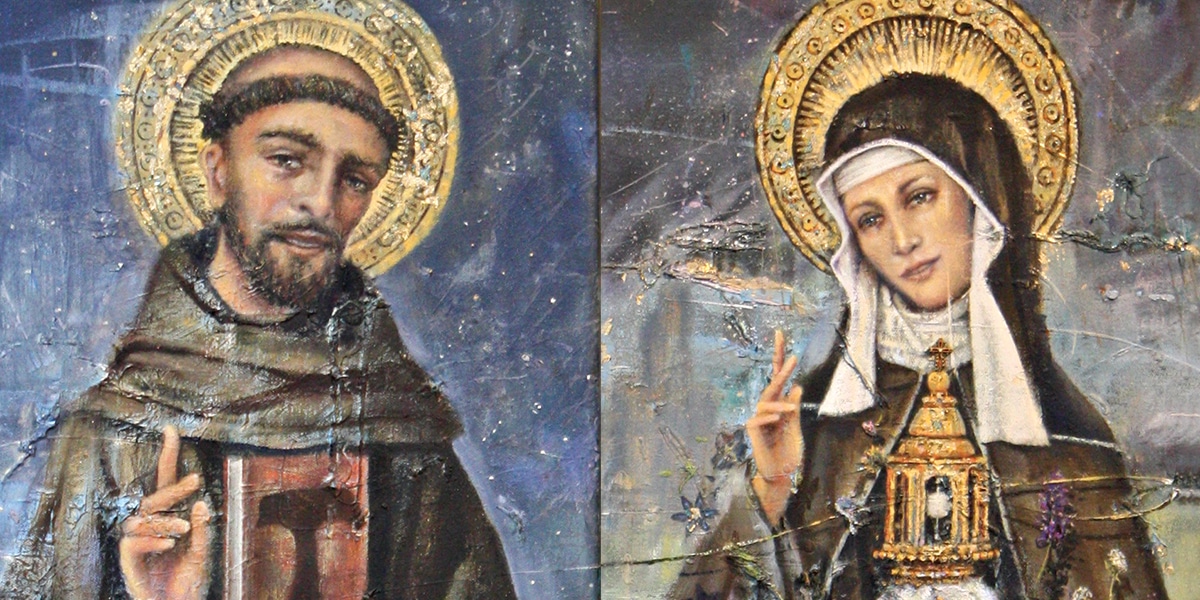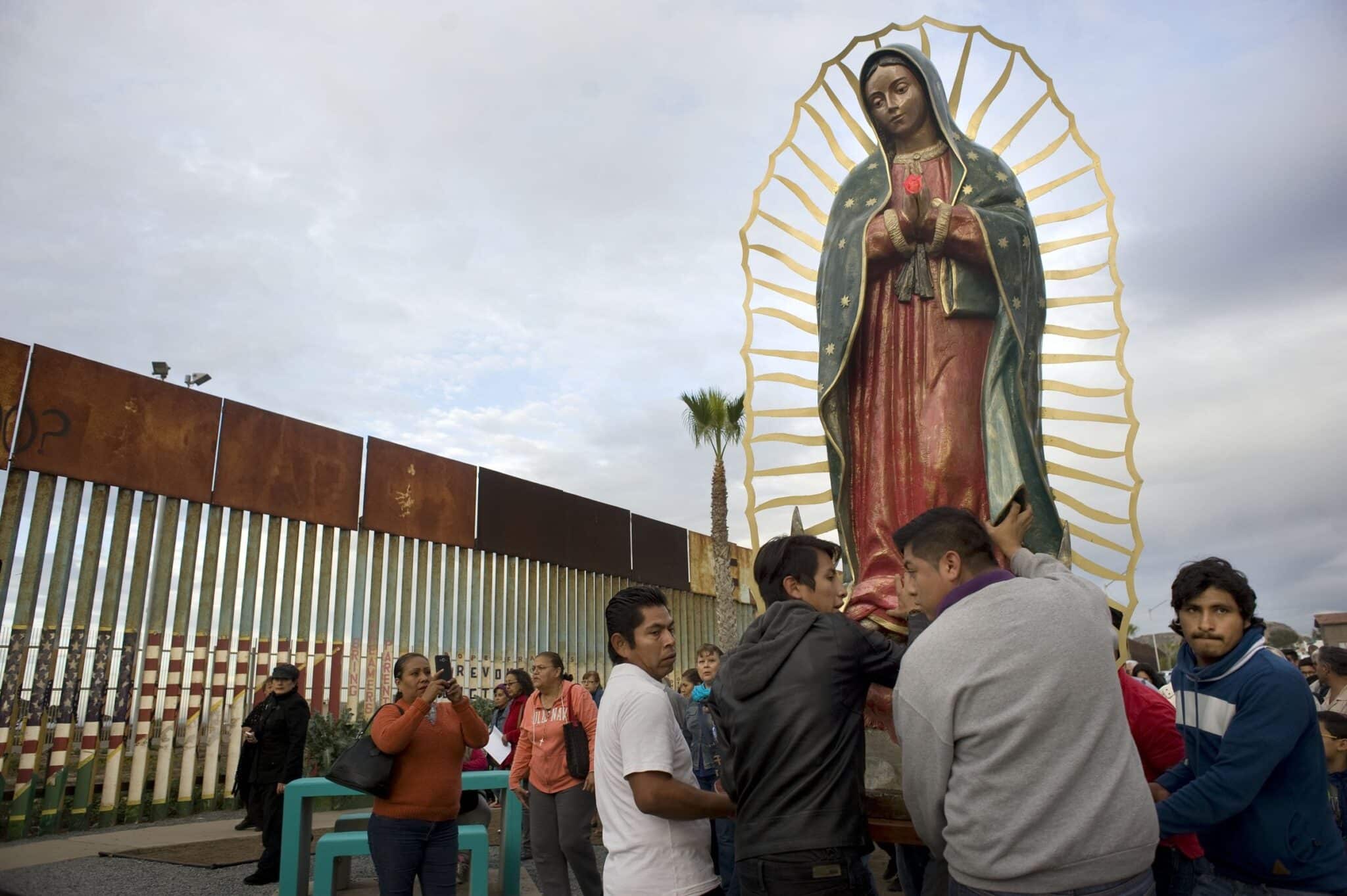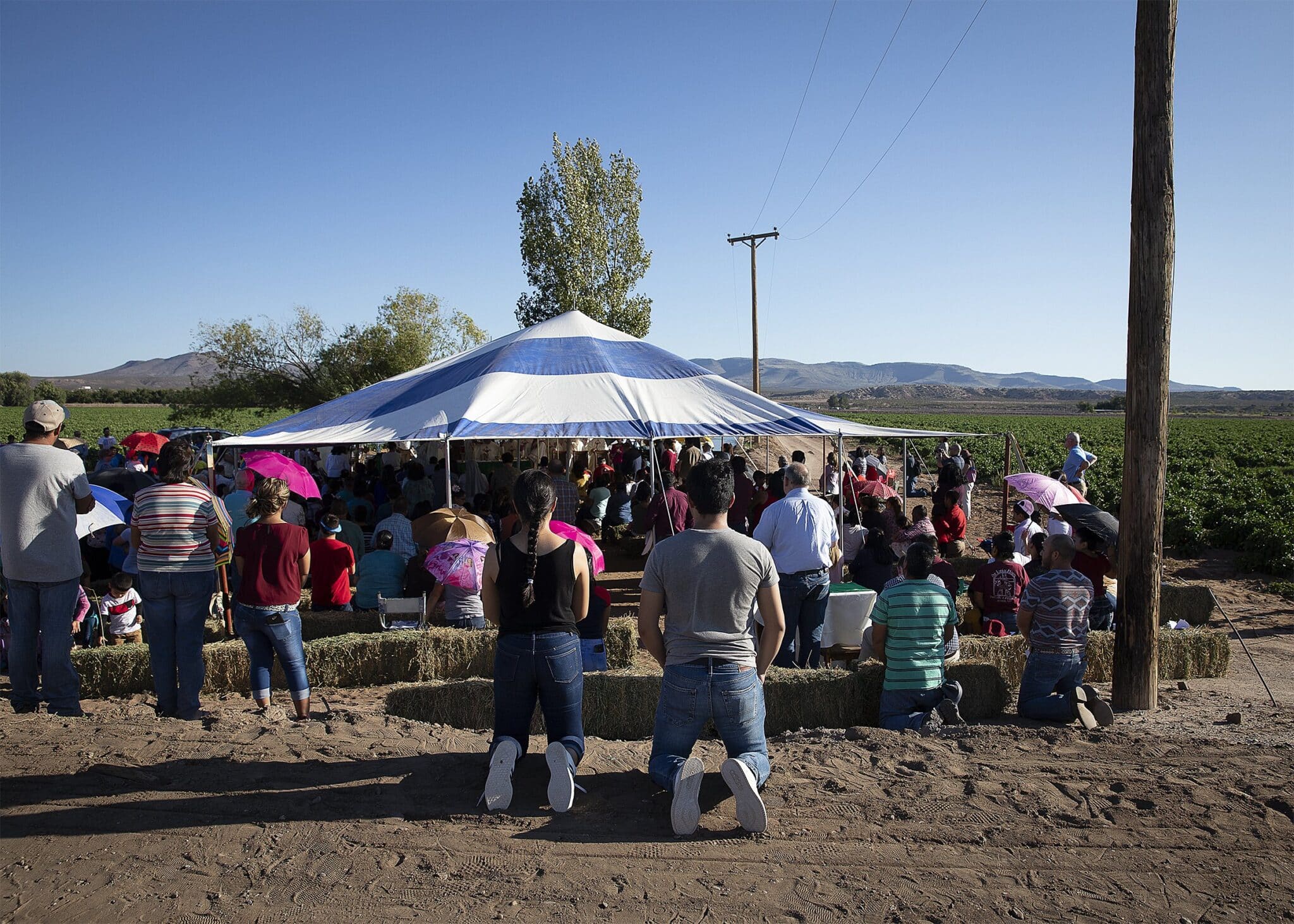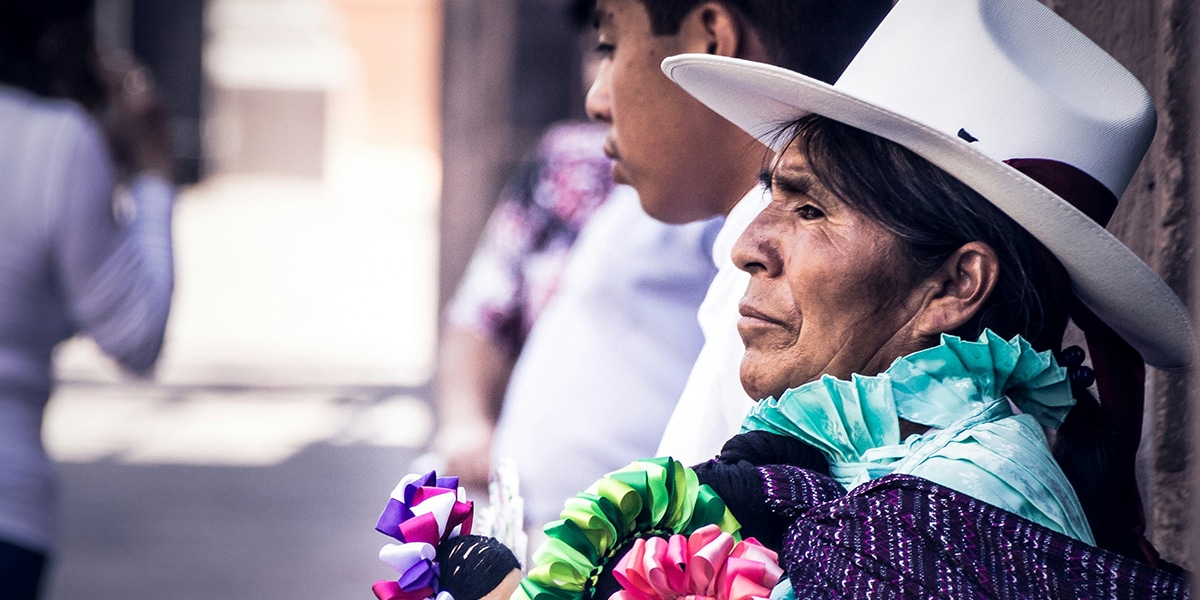Metanoia is a process of change, of deepening conversion. Francis and Clare can be models for us today as we try to live out the Gospel in our own challenging times.
This year has been all about courage and change. Facing a new virus, we now see its ripples spreading unemployment and economic insecurity for millions and upending the education of a whole generation. The uncertainties, stress, and suffering try our souls. COVID-19 has exposed some uncomfortable human truths: We need each other more than we acknowledge; and our radical commitment to one another and our willingness to collaborate are critical to our survival.
The devastating impact of this virus should steer us toward hard questions: How will I commit myself to what really matters? Where should I devote my time, energy, and talents to make a lasting, positive impact on the world? How can I work with others to create greater stability and see the fruits of wisdom, goodness, and love? What systemic change is this time calling forth from us? Now is the time to ask these questions together in a process that draws out our capacity for goodness and empowers us to engage the profound changes that our world requires—a process called metanoia.
Metanoia is a thorough, holistic process of change, rooted in a deepening commitment to goodness. Empowered by God, we place our whole selves in the service of something beyond the mere self. We grow into a coherent, compelling process of change as we see that we are part of a larger picture. Metanoia is the change in our hearts, choices, and actions as we see ourselves as part of a rich and diverse human family.
Courageous change is set in motion as we seek to honor God and one another, taking our place as stewards in the web of creation—trying to love it as God loves it, caring for it and for one another, attending deeply to the well-being of all. If Sts. Francis and Clare were here with us, they would be modeling metanoia just as they inspired it in their contemporaries nearly eight centuries ago.
Clearly, the world has changed a great deal since they lived, but some of our deep human needs have not. In helping us see what is possible when we collaborate with God and one another, Francis and Clare can sensitize us to what matters so that we invest ourselves in a process of growth that leaves no space untouched. Three steps of the metanoia in their lives can help us envision a courageous and hope-filled way forward.
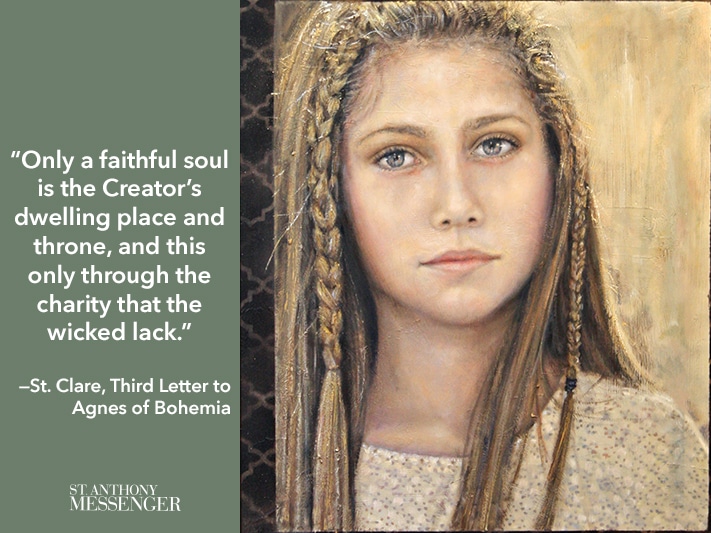
Unexpected Invitation
This stage of metanoia speaks to moments when life hands us something that causes us to question everything. Often this invitation is bewildering; it can be sudden, tragic, and life-changing. Francis of Assisi’s unexpected invitation came in the form of an entire year spent as a prisoner of war.
When Francis was only 16, his father helped fund a revolt of the merchant class, prompting a tragic cycle of violence. The merchants, who could not own land, rose up against the landowning nobles, who fled to neighboring Perugia. Four years later, aligned with the Perugian army, members of the noble class mounted an attack to take back their homes and property.
Poised to inherit his father’s luxury cloth business, 20-year-old Francis rode out with the other young men of Assisi in 1202 to intercept the attacking forces. He was struck down and taken hostage. Facing the possibility of dying in a prison cell in Perugia, Francis began to ask himself what was really worth fighting and dying for. He worried that nothing in his life had been meaningful, lasting, or significant. Confinement and solitude helped him appreciate what was at stake in the values that communities embody.
Clare, only 5 years old during the initial uprising in Assisi, fled with the nobility to Perugia. She spent seven years exiled there, learning to read, write, sew, and manage a household. Clare was being prepared for marriage into another noble family, even as she observed the devastating impact of conflict over property. Although Clare and Francis did not yet know one another, seeds of new life were germinating in two of Christianity’s greatest saints, both displaced from Assisi by war and wondering if there was a better way.
Both Sts. Francis and Clare saw the disruption of war as an unexpected invitation to question “business as usual” and to place integrity and care at the center of the social, economic, and religious norms of their day. Will we today let COVID-19 invite us to a similar set of changes? Can we focus our energy on doing what truly helps people thrive? Can we begin the process of honestly identifying all that is not working in our world so that we can creatively orient ourselves toward a better way?
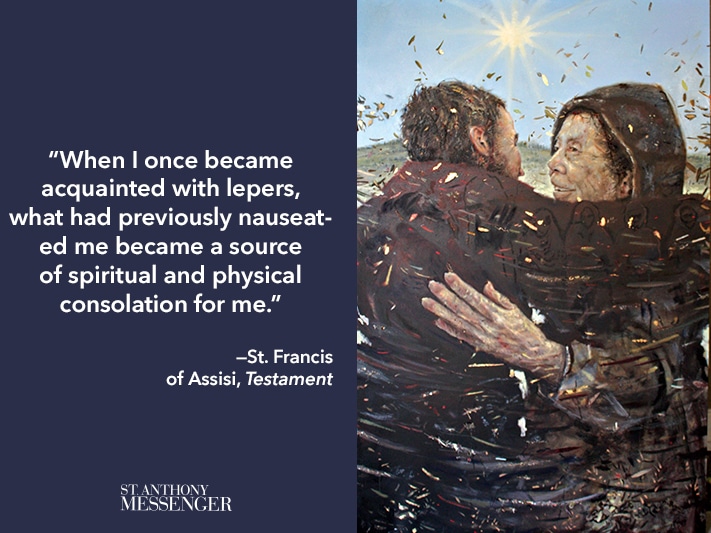
Eyes to See
How will we know what makes a better way? The second stage in this process of courageous change involves genuine, caring relationships that awaken us to the beauty, fragility, and goodness of life, helping us to experience God in those spaces of encounter. For Francis, this second stage of metanoia occurred in one of the most frightening spaces of the medieval world: a leper colony.
Medieval lepers were forced to live outside the city walls and forbidden human contact. They were prohibited from common water sources—streams, fountains, or wells. As the disease progressed, they lost physical function and wasted away, condemned to a slow, anonymous death in the colonies that set them apart. Like most of his contemporaries, Francis deliberately avoided contact with their misery.
In his Testament, Francis tells us that a singular grace of God led him into a nearby leper colony where, to his surprise, he experienced a surge of tenderness toward them—an outpouring of love and solidarity that he knew was beyond his own capacity to generate. The lepers’ intense need triggered in Francis an equally intense desire to alleviate the suffering of people who had always horrified him. All of this showed Francis who God was and who God called him to be.
This experience was not simply a moment of pity, charity, or kindness; it was a threshold space, drawing Francis into relationships that invited him to change. In addition to gaining eyes to see lepers as his sisters and brothers, the relationships Francis cultivated with them gave him eyes to see the world from their vantage point, highlighting the deep-seated inequities, indifference, and contempt that held its exclusionary structures firmly in place. The coldness and superficiality of his lifestyle were laid bare as Francis now saw the hollowness of his choices, his goals, and his investment of time and energy.
The faces of his sisters and brothers in the leper colony remained with him, permeating his life and keeping Francis from “business as usual” within the city walls. Francis’ growing empathy and solidarity led him to ask himself: Do I really have the right to pursue my own interests when others suffer so greatly? What does my connection with those who suffer mean in my daily life—what I eat or wear, whom I work for, and what I do or refuse to do? These questions gnawed at Francis, who came to see them as a profound grace and a rich invitation to change.
Radical Departure: Beyond Barriers
Artist’s statement: Clare nurses Francis after he has received the stigmata. He also suffered from a serious eye disease. Francis looks at the viewer with invitation and shows his consolation in the knowledge that Clare will keep his spirituality alive after his nearing death.
The third stage of metanoia is a space of decisive action, stemming from all that has been stirring within. Francis’ departure began with an act of tremendous courage, solidarity, and love that shocked his family and friends. Stripping himself naked before the bishop of Assisi, Francis offered his father back his clothing, inheritance, and the status and privilege they represented.
In the valley below Assisi, Francis set about rebuilding churches, laboring with the poor, begging for food and sustenance, and slowly gathering a community of people ready to live out the Gospel in poverty, simplicity, humility, and radical love. Francis and his followers called themselves Lesser Brothers, and it did not take long for Clare’s cousin Rufino to join the community.
When Clare returned to Assisi after the war, this movement was still in its infancy. She helped sustain it with money taken from her dowry, deepening her commitment through conversation with Francis, who clearly admired her determination and singleness of heart. Clare was, from the beginning, more than a patron of the fledgling community. In them, she saw the embodiment of what she, too, wanted: the Gospel way of radical simplicity, solidarity, and care.
Slipping out of her family’s palace late one night, Clare headed to the Chapel of St. Mary of the Angels, recently rebuilt by the Lesser Brothers. Kneeling, she consecrated herself to God as Francis cut her hair and received her vows with the tonsure of religious life. Knowing that rejecting her arranged marriage would stir anger from her male relatives, Francis took Clare to a Benedictine convent protected by a papal privilege of sanctuary for women.
Shortly afterward, men from her family stormed into the church and tried to carry her away by force. Pulling off her veil, Clare joyfully showed them the tonsure that made her at once unmarriageable and fully free to stand as one with the poor. Stunned and perplexed by this turn of events, the men returned to their palace.
Challenging Questions
Most of us today stand somewhere between the radical commitment of Sts. Francis and Clare and the perplexity of those they left behind. In our awareness of the suffering of the poor and marginalized people everywhere, can we allow the COVID-19 virus—the vulnerability it generates and the intensity of human need that it exposes—to give us eyes to see? Will we turn our backs on the inequities of our social structures, or can we contemplate them deeply, letting that insight give us courage to change?
This can be our prayer as we look to our common future: “Give us eyes to see and courage to change.” This simple mantra can lead us into the very heart of what it means to be human, to be a people, a single human community.
Ultimately our relationships with others will give us the courage, motivation, and discipline to make a real break with past patterns and forge something new. When, like Francis and Clare, we allow connection and compassion to deepen into solidarity and kinship, we can choose a new way of being connected to others—one that, Pope Francis assures us, will help us discover “what it is to be a people, to be part of a people.”
It will take courage to acknowledge the inequities in our world and to change the forces that diminish our dignity. How will we begin?
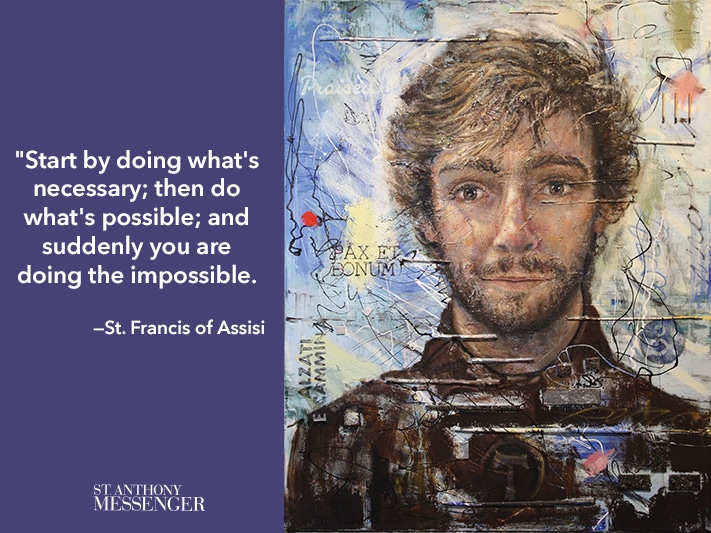
Small Steps to Prophetic Witness
We can start by choosing love rather than fear, remembering that we are not alone but are reaching toward God and one another. In the darkness of our fears of the virus, may we have the courage to allow our connection with God and one another to show us that love is still alive in our world.
Both honesty and angst emerge from the simple words of Francis’ own Testament as he describes his first steps toward courageous change: “No one told me what I should do.” This aloneness taught Francis to turn constantly to God for refuge, strength, and counsel.
We can follow this example by giving ourselves wholeheartedly to the process of change ignited by a genuine, healthy relationship with God. Let us allow the darkness of this pandemic to winnow us of lesser things—so that nothing displaces the invitation to newness in God that each day offers. Let us not delay!
What is more consoling and empowering than knowing that we are loved, that we are not alone, that we can risk ourselves on new endeavors and challenges? We become stronger, more creative, and more resourceful in that space of shared energy that we create with God and one another.
Our character—as individuals, as communities, even as a species, a human family—is at stake. This pandemic gives us new eyes to see the patterns, habits, and systems that have not supported human wholeness or the well-being of our earth. Now is the time to ask the hardest questions about what truly matters. We cannot be satisfied with superficial questions or with inadequate or ideological answers. Thomas Merton once said that the first step of the interior life is to “unlearn our wrong ways of seeing, in order to acquire a few of the right ones.” Let us allow God and those in need to show us the pressing questions of our day.
There are no easy answers to those questions, but one thing we know: In us, with God, there is a capacity to change—a capacity that deepens as we learn the love that is God. May we, like Francis and Clare, have the courage to build together a world that is truly home for all. In our common vulnerability, may we each share the best of ourselves, for, as Anne Frank wisely observed, “No one has ever become poor by giving.”
Courage and generosity, the fruits of love, are a prophetic witness in a world that so often lacks both eyes to see and the habit of thinking collaboratively about the common good. As we learn these habits once more, we can forge together a new path toward human flourishing.
Metanoia in Our Day
The three steps of metanoia described in this article are three of five steps vividly brought to life in a collaborative project that immerses people into the vision of Francis and Clare for today. The exhibit, featuring art by Holly Schapker and narrative by Gillian T.W. Ahlgren, is designed to allow individuals and communities to reflect on the dynamics of change; the role of encounter; the perspectives gained in engaged dialogue with others and accompaniment of those at the margins; and the community practices that create safe space for honesty, accountability, and genuine transformation of self and society.
Holly Schapker has been painting for over 30 years with installations and commissioned pieces in universities, galleries, churches, and residences across the world. She has a passion for spirituality and the creative process. Her quest for truth, goodness, and beauty is found in every one of her paintings. You can learn more about Holly and her work at HollySchapker.com.


